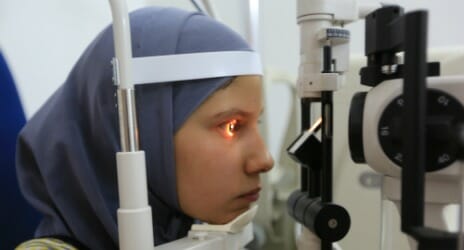By Penny Sims and Vivian Tou’meh, Damascus
Sulaf, 15, and her 7-year-old sister Hiba are waiting their turn at the Syrian Arab Red Crescent’s children clinic in Dwailaa areas, Rural Damascus.
The two girls are diabetic, and waiting to get their insulin. Sulaf has been having problems with her eyesight too and her family are concerned.
Displacement makes dealing with ongoing chronic conditions, such as diabetes, much more difficult. Families don’t have ready access to medication. Conditions that would usually be monitored at home are going unchecked, which is placing a strain on a health service that is already under severe pressure. (52) Clinics and dispensaries are operating by SARC around the country. This dispensary had been attached by a mortar shell on the beginning of April this year but it is still keep working.
The doctor said they are seeing around 1 child with hepatitis (A) every day, just at this one facility. She was concerned that a lack of safe drinking water could lead to an outbreak of the disease in this area – potentially reaching epidemic levels.
Some people are experiencing water cuts or having to pay to trucking water-which sometimes does not come from safe sources. Unofficial water trucks may bring supplies from unsafe wells or untreated river water.
Water shortages are increasing the burden even further, as doctors warn of potential epidemics.
One doctor, Nour Sbenati, at the clinic called for a vaccination campaign in order to address the growing threat of disease.
“The shortages of water trigger increases in conditions such as lintels, scabies and waterborne diseases”, she explained.
The staff at the clinic are trying to identify as many cases as possible to halt the disease. The doctor Sbenati explains: “As a first step we ask the patient about the source of potable [drinking] water and about the areas he/she is displaced from. Then we ask for liver enzymes test.”
The clinic opens six days a week and treats patients of all ages, including both displaced Syrians and existing community. While all people are affected by the crisis in one way or another, the clinic is aware of the particular vulnerabilities of the displaced population: “when there are shortages in medicines, priorities are for the displaced” the clinic’s doctor explained.
While the most common conditions at the clinic are related to diabetes and blood pressure, they have also seen increasing numbers of women suffering from anaemia and malnutrition. The women’s clinic typically sees 20-25 patients a day, many with these problems. They also report seeing more pregnancies due to the lack of available contraception, or access to regular health services. “We think communities now need more awareness about their health care”, the gynaecology clinic’s doctor explained.
The clinic has also seen a big increase in people needing glasses, wheelchairs and walking devices. These are everyday matters of health support, but the ongoing crisis means more people are seeing manageable conditions getting much worse than they need to be. Many people are suffering unnecessarily from treatable, or manageable, conditions. At the ophthalmology clinic we met again with Sulaf and her sister:
Sulaf’s mother was in shock: “the doctor said that her Sulaf’s optic nerve is damaged and the cause is the high degree of her diabetes”.
The SARC doctor promised to send a diabetic test machine that can be used at home to help reduce the pain the two girls suffer from daily injections. The Danish Red Cross is aiming to provide more self-testing machines for children at the clinic.
While the Red Crescent can offer some support to Sulaf – with the self-testing kit to aid pain-management, and referral to the SARC psycho-social support project – the damage to Sulaf’s optic nerve has already been done and cannot be reversed.
For Sulaf and her family, this is another challenge for them to face together. A family that is already displaced, grieving for their lost father, unable to send their children to school and trying to survive on one small salary. In a crisis, each new problem is a mountain to climb.
Around 2,300 patients receive medical services and consultations through Dwailaa Dispensary every month. 800 out of them are children.




Discussion about this post